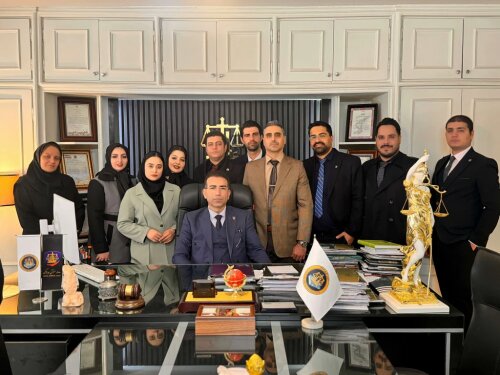Best Conveyancing Lawyers in Iran
Share your needs with us, get contacted by law firms.
Free. Takes 2 min.
Free Guide to Hiring a Real Estate Lawyer
Or refine your search by selecting a city:
List of the best lawyers in Iran
About Conveyancing Law in Iran
Conveyancing refers to the legal process of transferring ownership of real estate or property from one party to another. In Iran, conveyancing is regulated by a combination of civil law, custom, and administrative procedures. The process involves several legal steps, including verifying ownership, drafting sale contracts, addressing taxation obligations, and officially registering the property transfer with governmental authorities. Iranian conveyancing law aims to ensure the legitimacy and transparency of real estate transactions and protect the rights of all parties involved.
Why You May Need a Lawyer
Property transactions in Iran can be complex, involving intricate laws and numerous parties. Common situations where individuals might require a lawyer's assistance in conveyancing include:
- Buying or selling property to ensure all legal documents are accurate and binding.
- Resolving disputes over property boundaries or ownership rights.
- Transferring inherited property to heirs or beneficiaries.
- Dealing with properties that have unclear or disputed titles.
- Navigating tax implications, mortgages, or loans connected to real estate.
- Complying with the requirements of non-Iranian citizens or dealing with foreign property ownership.
A qualified lawyer can safeguard your interests, minimize legal risks, and ensure the property transfer process complies with Iranian laws.
Local Laws Overview
Key aspects of Iranian laws relevant to conveyancing include:
- Civil Code: The Iranian Civil Code governs property rights, ownership transfer, and contractual agreements. It outlines the requirements for legally binding sales contracts.
- Official Registration: All property transfers must be registered with the Organization for Registration of Deeds and Properties. Unregistered transactions are not legally recognized.
- Document Verification: The buyer and seller must provide official title deeds, land registration documents, payment records, and proof of identity.
- Notary Public Involvement: Iranian law requires that certain real estate documents be signed and witnessed by an official notary public.
- Taxation: Sellers are responsible for paying capital gains tax and transfer fees. Buyers may also have to pay certain taxes and duties.
- Foreign Ownership Restrictions: Non-Iranian citizens face restrictions on acquiring property. Any such transactions must receive approval from relevant ministries and authorities.
- Inheritance Laws: Real property is subject to Islamic inheritance law, which influences property transfers after a proprietor’s death.
Frequently Asked Questions
What is conveyancing in Iran?
Conveyancing in Iran is the legal process of transferring property ownership from one individual or entity to another, involving contract drafting, document verification, and official registration with government bodies.
Do I need a lawyer to buy or sell property in Iran?
While not legally mandatory in all cases, it is highly recommended to consult a lawyer for property transactions to ensure legal compliance, minimize the risk of fraud, and handle paperwork.
How is property ownership proven in Iran?
Ownership is demonstrated through official title deeds (Sanad-e-Malekiat) and registration certificates issued by the Organization for Registration of Deeds and Properties, and these documents must be up to date.
What taxes apply to property transactions?
Both buyers and sellers might be liable for taxes, including property transfer tax, capital gains tax, and municipality fees. The seller is typically responsible for most taxes, but payment arrangements can be negotiated.
What happens if a property is not officially registered?
Unregistered property transfers are not recognized under Iranian law. This means full legal ownership does not transfer, and the parties involved may face legal challenges in the future.
Can foreigners buy property in Iran?
Foreign nationals can buy property in Iran, but they face certain restrictions and must secure government approval. The process often involves more paperwork and checks.
What are the risks of buying property without legal advice?
Risks include potential fraud, invalid contracts, hidden encumbrances on the property, incorrect tax payments, and issues with title registration.
How long does the conveyancing process take?
The timeframe varies depending on documentation, due diligence, and government processing times. Typically, the process can take from a few weeks to several months.
What is the role of a notary public in property transactions?
A notary public is responsible for verifying the identities of the parties, witnessing the signing of contracts, and ensuring that the transaction meets all legal requirements before registration.
What should I do if there is a dispute in a property transaction?
If a dispute arises, seek immediate legal advice. A lawyer can help resolve issues through negotiation, mediation, or legal proceedings if necessary.
Additional Resources
Those seeking further information or assistance with conveyancing in Iran may consult the following resources:
- Organization for Registration of Deeds and Properties
- Iranian Notaries Association
- Ministry of Justice - Property and Registration Affairs Department
- Local Bar Associations for referrals to qualified conveyancing lawyers
These organizations can provide guidelines, documentation checklists, and direct you to accredited professionals.
Next Steps
If you are considering buying or selling property in Iran, follow these steps:
- Gather all relevant property documents, including title deeds and identity papers.
- Consult with a qualified lawyer who specializes in conveyancing law in Iran.
- Ensure that the property is free from legal encumbrances, debts, or disputes.
- Work with both the notary public and your lawyer to draft and review the sale contract.
- Complete official registration and fulfill all taxation obligations.
- Keep thorough records of your transaction for future reference.
Taking these steps with legal support will help protect your interests and ensure a transparent conveyancing process in Iran.
Lawzana helps you find the best lawyers and law firms in Iran through a curated and pre-screened list of qualified legal professionals. Our platform offers rankings and detailed profiles of attorneys and law firms, allowing you to compare based on practice areas, including Conveyancing, experience, and client feedback.
Each profile includes a description of the firm's areas of practice, client reviews, team members and partners, year of establishment, spoken languages, office locations, contact information, social media presence, and any published articles or resources. Most firms on our platform speak English and are experienced in both local and international legal matters.
Get a quote from top-rated law firms in Iran — quickly, securely, and without unnecessary hassle.
Disclaimer:
The information provided on this page is for general informational purposes only and does not constitute legal advice. While we strive to ensure the accuracy and relevance of the content, legal information may change over time, and interpretations of the law can vary. You should always consult with a qualified legal professional for advice specific to your situation.
We disclaim all liability for actions taken or not taken based on the content of this page. If you believe any information is incorrect or outdated, please contact us, and we will review and update it where appropriate.
Browse conveyancing law firms by city in Iran
Refine your search by selecting a city.

















